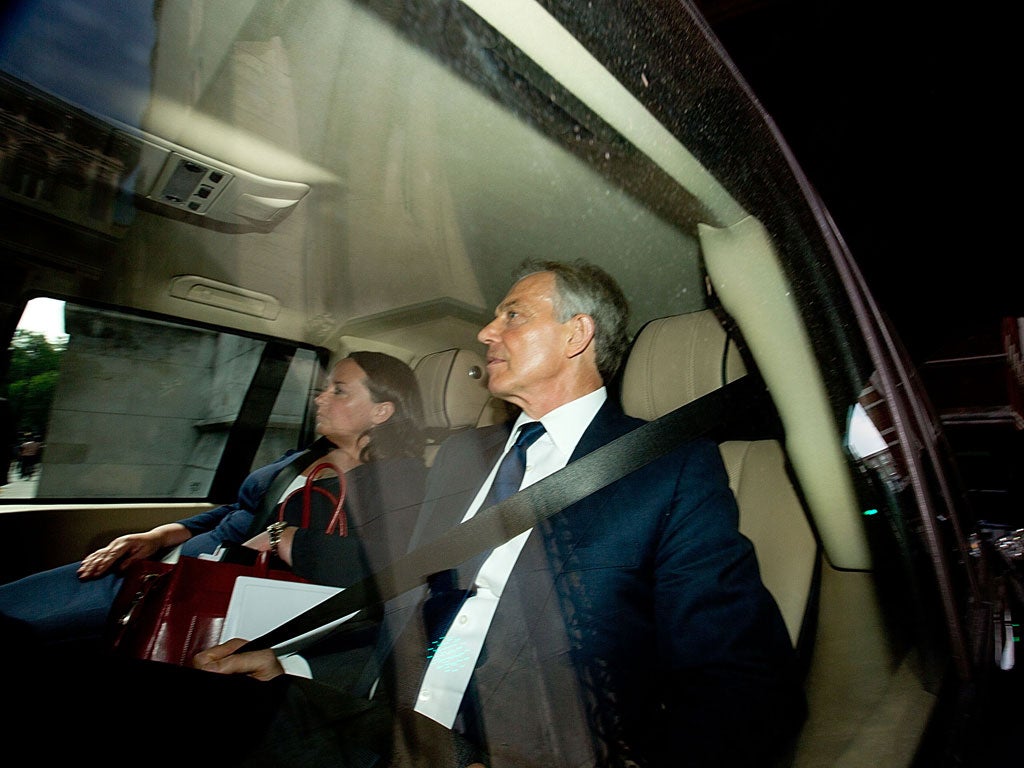Pretty straight from the ex-PM? It depends how you interpret the evidence
Star witness's carefully chosen words left key questions open, reports James Cusick

In a courtroom just off The Strand, Anthony Charles Lynton Blair yesterday set out his version of history when it came to dealing with Rupert Murdoch and his various lieutenants; the invasion of Iraq; the public criticism of his wife Cherie; the behaviour of his employees as they went after critics in the media; the poisoning of the British body politic and much more. Read on...
On a pact with Murdoch...
Claim: "We would never have given assurances to Mr Murdoch or anybody else that we were not going to change policy without seeking their permission." Blair said there was no "deal" with Rupert Murdoch and he felt no pressure from the commercial ambitions of the Murdoch press.
Explanation: Blair, a trained barrister, quietly offered a crucial caveat on this subject. He said that if you fall out with a big media empire, "then watch out, because it is relentless". Essentially, New Labour kept well away from Murdoch's no-go zones, giving him the commercial freedom he demanded.
On Iraq
Claim: "I would have been wanting to explain what we were doing." The inquiry heard that in the days before the start of the Iraq War in 2003, Blair made three phone calls to Rupert Murdoch on the 11, 13, and 19 March. He said calls were also made to a handful of other newspaper executives. "I don't think there's anything particularly odd about that when you are facing such an issue."
Explanation: The day before the first Murdoch call, Blair had given Saddam new tests to comply with, which included having weapons of mass destruction. The attorney general, Lord Goldsmith, had already warned No 10 that the safest legal course was securing a second UN resolution. That wasn't looking likely.
Blair needed serious support. The call to Mr Murdoch on 13 March was the same day that Lord Goldsmith suddenly changed his mind on the legality of the war. The call on 19 March followed the Commons vote which gave the parliamentary backing he needed to avoid resignation. War was now inevitable.
On bullying by Alastair Campbell and Peter Mandelson
Claim: "We ran a perfectly proper media operation ... I never briefed against people, that is the lowest form of politics."
Explanation: Blair said he would rebuke anyone he suspected of briefing against people. He denied that New Labour's other architects, Peter Mandelson and Alastair Campbell, had bullied journalists. For senior political journalists who dealt with Campbell and Mandelson, this is an unrecognisable description of the New Labour spin kingdom. Blair was claiming their actions and ruthlessness were unknown to him.
On calling off the phone hacking inquiry
Claim: "Absolutely not true." Tom Watson, a former minister in both the Brown and Blair governments, who has since led the parliamentary investigation on phone hacking, has claimed Blair was asked by Murdoch to back off from probing into hacking. The message to Watson, he claimed, was passed on through Gordon Brown.
Explanation: It is a case of who do you believe? Watson says he is sure the call was made in 2009. In May 2008, News International's leading counsel, Michael Silverleaf QC, warned the company of the "culture of illegal information access" and that any trial would be "extremely damaging".
If Rupert Murdoch was warned, the call to Blair was him trying to protect his empire. Brown says he cannot remember such a conversation.
On The Independent
Claim: "The Independent was launched as a new newspaper that would separate out comment from news – but then its editor called it a 'viewspaper'." Blair was complaining to the inquiry that British journalism could often lose its way by deliberately blurring the distinction between comment and news.
Explanation: The "comment" Blair disliked most was comment against himself and New Labour. "Comment" in newspapers like The Independent sought to look behind the "facts" Downing Street were supplying – facts "spun" to make the government look good and Blair even better. The Independent deliberately renamed a section of the paper, "The Viewspaper". Blair was said not to have been amused.
Subscribe to Independent Premium to bookmark this article
Want to bookmark your favourite articles and stories to read or reference later? Start your Independent Premium subscription today.

Join our commenting forum
Join thought-provoking conversations, follow other Independent readers and see their replies